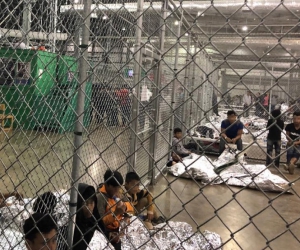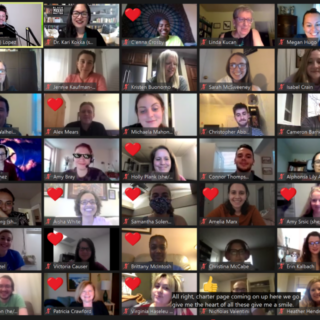
Pitt School of Education Position Statement on the Detainment and Separation of Migrant Children from Their Families

Over the past month, the world has watched, aghast, as thousands of children were separated from their families when seeking to cross the border into the United States. Families were detained together and apart, and the federal government failed to meet the Justice Department’s deadline of reuniting children with their adult caregivers. With only scant government-approved footage of holding cages and audio of crying children, there was collective outrage and heartbreak that the federal government would actually implement such inhumane policies.
The detainment and separation of families, is, unfortunately, not a new phenomenon in the push-pull forces of domination that propel vulnerable peoples to seek safety far from home. What we have been witnessing is, in that sense, not unprecedented. It is next-level, with children and families being used as pawns for international economic interests and domestic political grandstanding. It is distinct in its shape and purpose, but it is also connected to the unseemly history this nation has with separating Indigenous children from their parents and placing them in government boarding schools, selling enslaved Black children, ripping family bonds, and interning Japanese families when they were seen to be a foreign threat. This larger sociohistorical history must play a prominent role in how we educate our teachers and support our schools to build relationships with children and families living in this reality.
As a School of Education, we know that these current events are horrific symptoms of a long history of other events that have long-term implications for all of us. We know that prying children from already vulnerable families will only create shockwaves of trauma for children. To support these children for years to come, educators will need responsive and specialized understandings of approaches to working with children who have undergone such extreme suffering. Additionally, educators will also need preparation for supporting the socioemotional needs of children who have suffered deplorable conditions of privatized detention.
We are also acutely aware that it is not just our children and their families who are suffering from this outrageous government act. It is all of us. The tendency and perhaps the soul of the outrage at watching migrant children being separated from their families and held in privately-run cages is to claim that these children are innocent. As the Dreamers movement and migration scholars have documented for years, to cast some migrants as innocent means that others must be guilty. This is a dangerous line to walk, one that dovetails with respectability politics, parsing who deserves human basic rights. When we engage in deciding who is innocent, who is worthy of a country that proclaims meritocracy but does not deal with its history, we distance ourselves from redressing past and present harm. What we are witnessing is not, to paraphrase Mariame Kaba, a crisis about innocent children. It is about the shattering of human dignity. As a School of Education, we commit to repairing and strengthening our resolve to be protectors of human dignity and to educate our future students to do the same.
As educators, we have the powerful space of the classroom and in the community to speak up, act, and educate others about how to treat each other differently. To do this, Schools of Education need to provide our future teachers and school leaders with: (1) an understanding of the historical and social conditions that create the context we are living in today, and (2) a plan for creating restorative bonds with children, teaching what it means to be human with each other, and rejecting a politics of inclusion and exclusion that continues to disempower and impoverish the most vulnerable and sicken all of us. We all need to hear and heed the call for better education about why thousands of families are fleeing their homes and why loving parents would risk sending their children on dangerous journeys. We need to be answerable to our responsibility to supplement the incomplete information that is often espoused in the dominant narrative. This narrative often omits information that explains what has brought us to this state of inhumane treatment of each other. Families do not willingly send their children on dangerous and unsure journeys and endure the heart-wrench of separation unless there were dire conditions in their homeplace. Our nation’s educators need to understand these histories and current conditions, which this country has played an important role in creating, so that we can be accurately informed and provide accurate education.
Clearly, there is a major role for Schools of Education to play in supporting children and families facing the trauma of separation from one another, and in preparing educators to lead the next generation to stand in the way of attacks on human dignity. Those of us who may not have considered how incarceration of parents in any kind of prison impacts children should be moved to consider how separation of families has myriad negative effects. Those effects do not lay in wait outside our school doors. Children who are separated from their families, for any reason, are more likely to have those struggles surface in challenging behaviors (i.e. aggression, withdrawal, irritability and oppositional behavior). Correlated with societal stress, children and their family members may have an increased risk for developing Anxiety, Depression, PTSD, and other serious medical conditions (i.e. diabetes and heart disease). Unfortunately, schools are typically ill-equipped to support these children and families, and they often end up disproportionately placed in special education and/or excluded from “regular” education settings. This frequent yet ineffective practice leads to students who may reach the end of their schooling, but without having been offered the education needed to feel prepared for college, career or life.
This crisis presents an opportunity for us to live up to our responsibility to respond to the long-term consequences of our country’s actions. We can extend our response to support all children who are suffering the consequences of a nation that has many versions of incarceration, including prisons, detention centers, and makeshift holding facilities like the ones that have been most recently created. The School of Education at the University of Pittsburgh aims to answer this far-reaching call and prepare educators to teach with and for dignity.
Co-authors
Leigh Patel
Associate Dean for Equity and Justice
For more information: leigh.patel@pitt.edu
T. Elon Dancy
Director for the Center for Urban Education
Helen S. Faison Endowed Chair
Shannon Wanless
Director of the Office of Child Development




